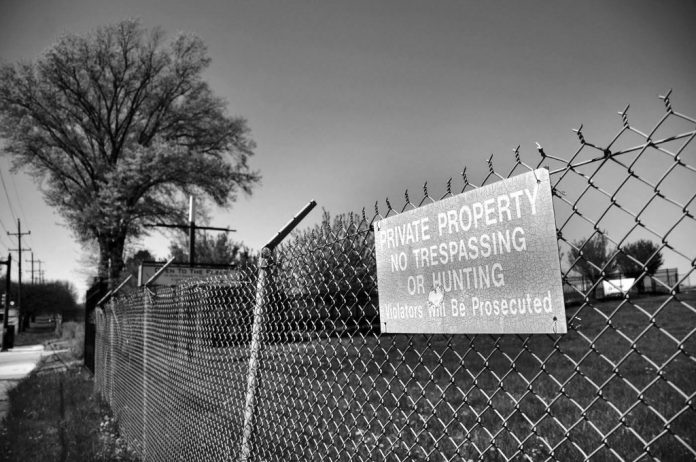The once known Island Green golf course property remains vacant, despite Teva’s (an international drug company) plan to build a large distributing facility on the land, Tuesday, April 10, 2012, Philadelphia, Pa. (Maria Pouchnikova)
Don’t expect to see an international drug company’s eight-story warehouse punching into the Northeast Philly skyline any time soon.
Israel-based Teva Pharmaceutical Industries Ltd., maker of one in six generic drugs sold in America, has put on hold plans to build its North American distribution center at 1 Red Lion Road, the site of the old Island Green golf course.
“Teva recently announced that it would be reassessing its global network footprint,” company spokeswoman Denise Bradley wrote Monday in an e-mail to the Northeast Times. “As such, we have made the decision to cease development plans for the proposed distribution center on Red Lion Road.”
The spokeswoman declined to elaborate on the company’s plans for the property, but did add that Teva was not looking to locate the distribution center anywhere else.
The announcement late Monday afternoon confirmed what City Councilman Brian O’Neill (R-10th Dist.) said he had learned earlier the same day. State Rep. Ed Neilson said he also had heard the same on Monday from a Washington, D.C.,-based Teva executive.
O’Neill said a company executive told him it intended to maintain the 136-acre property,
Mayor Michael Nutter spoke with top Teva executives Monday afternoon shortly before the company announcement was released, said his spokesman, Mark McDonald. The mayor will continue to work with Teva, McDonald said. What Teva announced Monday was a pause, McDonald said.
Budd Co. made railroad cars on the property before it became a golf course. It still is zoned for heavy industrial use, and is, perhaps, the largest such parcel in the city, O’Neill said.
Teva had been promised $4.7 million in state funds for the project, state Rep. Brendan Boyle (D-170th dist.) said Tuesday. That money was in the form of tax incentives and grants, he said, and the company already has received a small amount.
“They’re going to give it back, and that’s something I want to hold them to,” he said.
In late October 2010, Teva and several public officials announced the company had picked the property on the city’s border with Montgomery County to be the site of its new North American distribution center. Locating in Northeast Philly represented a $300 million investment for Teva.
The plan was to erect three multistory buildings with a total 1.1 million square feet of space. Six hundred construction jobs as well as 400 permanent jobs to the city were expected. Also predicted were about 250 trucks a day entering and leaving the new facility once it was up and running in mid-2013.
Teva bought the property for more than $40.5 million in August 2011. A month later, the mayor and other public officials once again joined company executives at a groundbreaking.
“I love Teva,” the mayor had said, calling the company’s Philadelphia plans the biggest economic development of his administration.
Asked last spring why nothing was happening on the property, Bradley had said Teva’s top management had changed and was reviewing the company’s business strategy.
During the summer, Bradley said questions would be answered after a company meeting Dec. 11. However, plans to halt the company’s Northeast Philly project were not announced until late in the business day Monday.
A couple local civic leaders were heartened by the news. Dolores Barbieri, who had been concerned about the impact of large numbers of tractor-trailers rumbling through the neighborhood, said she was happy to hear Teva’s announcement. Jack O’Hara, president of the Greater Bustleton Civic League, said he felt “a huge relief.”
Two public officials said they were disappointed by the company’s decision to reverse course.
“While I am very disappointed in Teva’s decision,” state Sen. Mike Stack (D-5th dist.) said, “I remain hopeful that at some point they will build the distribution facility at Red Lion Road.”
“It’s a loss for economic growth for the city and the region,” U.S. Rep. Allyson Schwartz (D-13th dist.) said in a released statement. The congresswoman said she was ready to work the company, community and the city to find a use for the property that “can benefit the people and economy of Southeastern Pennsylvania.”
So far, the company’s economic impact has been confined to paying more than $120,000 a year in real estate taxes on the large, fenced property. ••
Reporter John Loftus can be reached at 215–354–3110 or [email protected]





